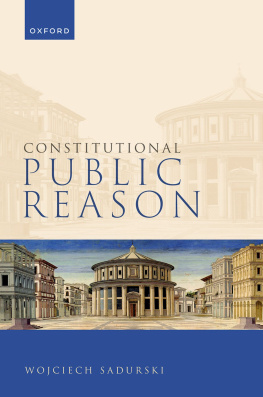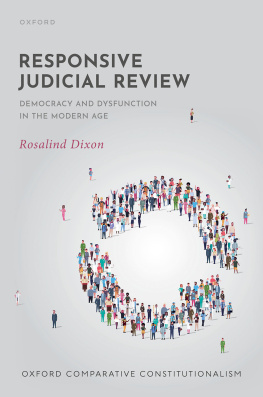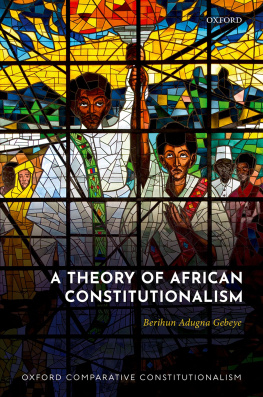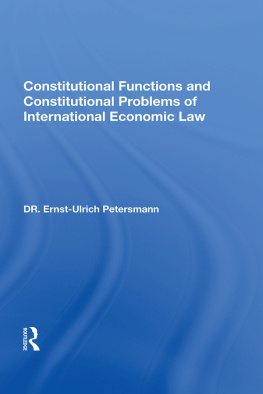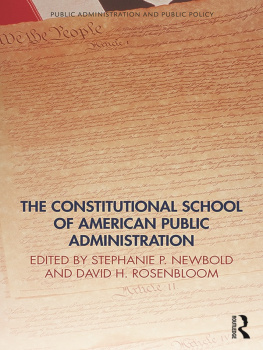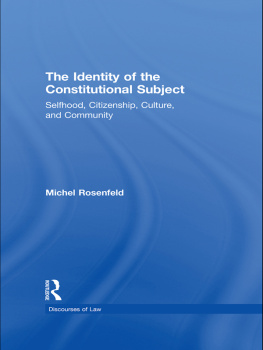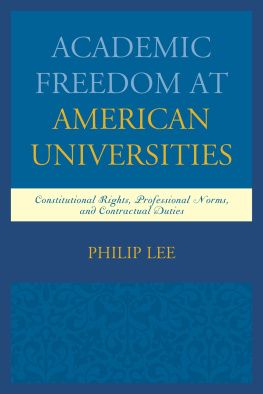Constitutional Public Reason

Great Clarendon Street, Oxford, OX2 6DP,
United Kingdom
Oxford University Press is a department of the University of Oxford.
It furthers the Universitys objective of excellence in research, scholarship, and education by publishing worldwide. Oxford is a registered trade mark of Oxford University Press in the UK and in certain other countries
Wojciech Sadurski 2022
The moral rights of the author have been asserted
First Edition published in 2022
Impression: 1
All rights reserved. No part of this publication may be reproduced, stored in a retrieval system, or transmitted, in any form or by any means, without the prior permission in writing of Oxford University Press, or as expressly permitted by law, by licence or under terms agreed with the appropriate reprographics rights organization. Enquiries concerning reproduction outside the scope of the above should be sent to the Rights Department, Oxford University Press, at the address above
You must not circulate this work in any other form and you must impose this same condition on any acquirer
Public sector information reproduced under Open Government Licence v3.0
(http://www.nationalarchives.gov.uk/doc/open-government-licence/open-government-licence.htm)
Published in the United States of America by Oxford University Press
198 Madison Avenue, New York, NY 10016, United States of America
British Library Cataloguing in Publication Data
Data available
Library of Congress Control Number: 2022941054
ISBN 9780192869678
eISBN 9780192696687
DOI: 10.1093/oso/9780192869678.001.0001
Links to third party websites are provided by Oxford in good faith and for information only. Oxford disclaims any responsibility for the materials contained in any third party website referenced in this work.
Preface
The legitimacy of democratically enacted laws is a key issue in contemporary constitutional theoryperhaps not the key issue, but certainly one of central dilemmas that various constitutional systems need to grapple with. It would appear that the question is particularly acute when a supreme or a constitutional court has the power to set aside statutes for their unconstitutionality, but the issue of legitimacy goes further than that. Whether or not judicial bodies have such an authority, a meaningful question that can always be asked is if a given lawbe it sub-constitutional legislation or even a constitution itselfcontains rules that are legitimate: that is, whether we all, subject to this law, have good moral reasons to respect and comply with it, regardless of whether or not we agree with the particular rule on merits. We, the concerned citizens, may as well adopt the hypothetical position of a constitutional judge, and model our thinking about the legitimacy of laws that apply to us on the reasoning typical of constitutional judges. Such a thought experiment naturally provides us with only one among many perspectives for evaluating lawsbut not an insignificant one. After all, in a democratic society marked by deep moral and political pluralism, in which consensus on the merits of some controversial laws is unlikely, we need to have some standards for ascertaining whether a law is worth our respectperhaps even our complianceeven if we happen to disagree with it. This is the function of the concept of the legitimacy of law.
A prevailing response to the question of legitimacy has focused on the effects of a given law: whether the consequences of the law are such that it does not impose unfair burdens upon anyone, however the unfairness is defined. This may be called (roughly, and not necessarily tracking the technical uses of this concept in the law and in scholarly literature) output legitimacy. But there is another way that (subject to the same proviso) is called input legitimacy: what sort of considerationsincluding motives, intentions, and purported purposes or aimswarrant the law? It is with a variant of that approach that this book will be concerned. It will look at public reason (PRan acronym that will be used throughout the book, despite its unfortunate connotations with that other PR).
PR is a concept frequently used in political philosophy but one that is less often seen in scholarship on constitutional law. As Mattias Kumm has noted as recently as in 2020: Surprisingly, notwithstanding the considerable literature on the idea of public reason among political philosophers, legal and constitutional The implication of this is clear: some arguments, if actually present in the minds of legislators or policymakers, are not qualified to figure in the public defence of a law. The law must be defensible in terms that belong to a forum of principle rather than an arena of political bargains, or power plays of naked interest, or competition between sectarian ideologies.
For all the problems, complications, and shortcomings of this idea (most of which will be confronted openly in
Mattias Kumm We Hold These Truths to be Self-Evident: Constitutionalism, Public Reason, and Legitimate Authority, in Silje Langvatn, Mattias Kumm, and Wojciech Sadurski (eds.), Public Reason and Courts (Cambridge University Press 2020) 143 , 143, footnote omitted.
See Miguel Vatter, The Idea of Public Reason and the Reason of State: Schmitt and Rawls on the Political, (2008) 36 Political Theory 239 .
Jrgen Habermas, The Inclusion of the Other: Studies in Political Theory (MIT Press 1998) 81, both emphases in the original.
Charles Larmore, The Autonomy of Morality (Cambridge University Press 2008) 146. For other well-known expressions of a similar idea, see Onora ONeill, Toward Justice and Virtue (Cambridge University Press 1996) 54 (Those whose actions and plans of action constantly assume the intelligent cooperation and interaction of many others, who differ in diverse ways, will also expect some at least of their reasoning to be followable by these others), emphasis added; T.M. Scanlon, What We Owe to Each Other (Harvard University Press 1998) 189 (articulating a non-rejectability requirement derived from contractualism).
.
Acknowledgements
Often, acknowledgements in academic books begin with a partly apologetic, partly self-deprecating (not necessarily sincere) confession that the book was too long in the making. This one is no exception, and my (sincere) excuse is that this work was interrupted by the felt need to write two other books, very quick in the making. But the duration of my work also explains why I incurred intellectual debts to such a large number of colleagues and research assistants (this latter category merging and overlapping with the former, so I will not draw a distinction here) in connection with this project:
Margot Brassil, Violeta Canaves, Adam Czarnota, Grainne de Burca, Ros Dixon, Kirsty Gan, Leszek Garlicki, Tom Ginsburg, Sam Goldsmith, Alon Harel, Sam Issacharoff, Nikila Kaushik, Pooja Khatri, Martin Krygier, Mattias Kumm, Silje Aamb Langvatn, Christopher McCrudden, Liam Murphy, Maria Paz Avila, Michael J. Perry, Niels Petersen, Philip Pettit, Rick Pildes, Robert Post, David Pozen, Dominik Rennert, Michel Rosenfeld, Michael Sevel, Sivan Shlomo-Agon, Alec Stone Sweet, Chantal Tanner, Alexander Tsesis, Jeremy Waldron, and Joseph Weiler. I was lucky, both as an academic and as a frequent traveller, to be able to share my ideas with colleagues at very many conferences and seminars, at Haifa Law School, Harvard Law School, Supreme Administrative Court (NSA) in Warsaw (a conference by Pastwo i Prawo journal), Loyola Law School in Chicago, University of Chicago Law School, University of Paris-Nanterre, University of Trento Faculty of Law, Tsinghua University in Beijing, National University of Singapore, Australian Society of Legal Philosophy (Sydney), University of Toronto Faculty of Law, National University of Singapore Faculty of Law, Thamassat University in Bangkok, Wissenschaftskolleg in Berlin, WZB Center for Global Constitutionalism in Berlin, Melbourne Law School, Academia Sinica in Taipei, Centro de Estudios Politicos y Constitucionales in Madrid, University of Amsterdam Faculty of Law, Harvard Law School, Kiyv-Mohyla Academy in Kiev, University of Western Ontario, Faculty of Law in London, Ontario.

